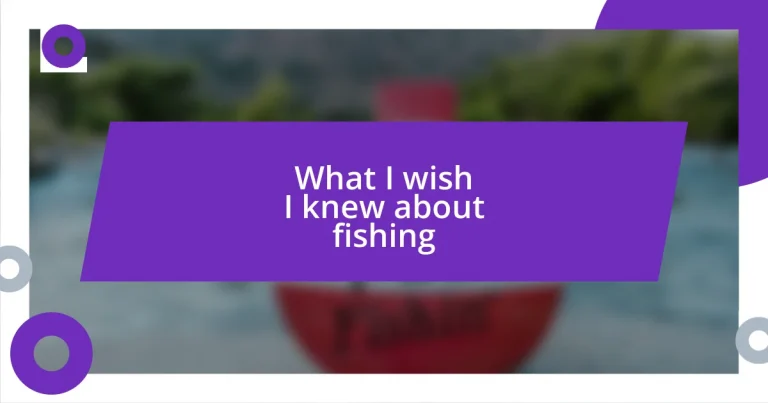Key takeaways:
- Invest in essential fishing gear, including a quality rod, reel, tackle box, and line, and keep your gear organized for efficiency.
- Choose the right fishing spot by considering water depth, structure, weather conditions, and observing other anglers for successful locations.
- Understand and follow local fishing regulations, practice proper gear maintenance, and embrace experimentation to enhance your overall fishing experience.
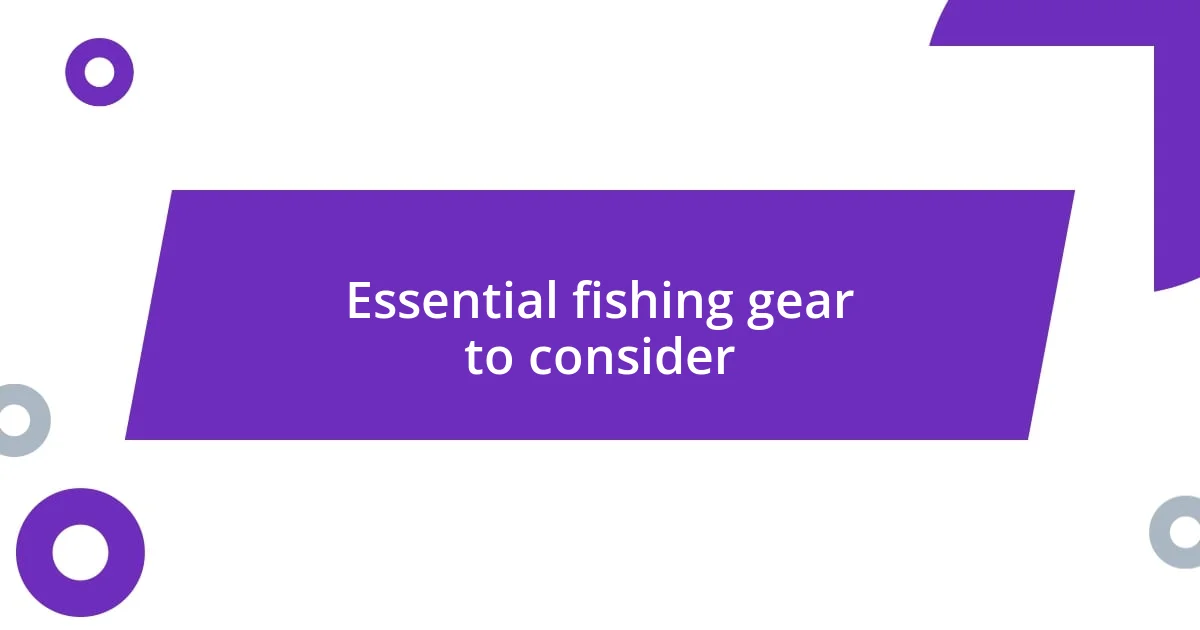
Essential fishing gear to consider
When I first started fishing, I was overwhelmed by the variety of gear available. I remember standing in the aisle of a sporting goods store, unsure if I should invest in a high-end rod or stick with something more budget-friendly. In my experience, the essentials include a good-quality rod and reel, a tackle box filled with various lures, hooks, and weights, as well as a sturdy line that suits the type of fish you’re targeting. Have you ever wondered how the right gear can elevate your fishing experience?
One of the most important pieces of equipment that I’ve come to appreciate is a reliable fishing tackle bag. Early on, I often found myself rummaging through my gear in a disorganized mess, wasting precious time that could have been spent fishing. A well-organized tackle bag not only helps you stay efficient but also keeps your passion from feeling like a chore. Trust me, there’s something particularly satisfying about knowing exactly where everything is when you’re out on the water.
Don’t overlook the importance of a good fishing rod holder. On my first solo fishing trip, I was trying to manage multiple lines without a holder—it was chaotic! I quickly learned the value of hands-free fishing; it allows you to relax while still keeping an eye on your lines. Which brings me to another question: Isn’t it great when a piece of gear helps you enjoy the moment rather than complicating it?
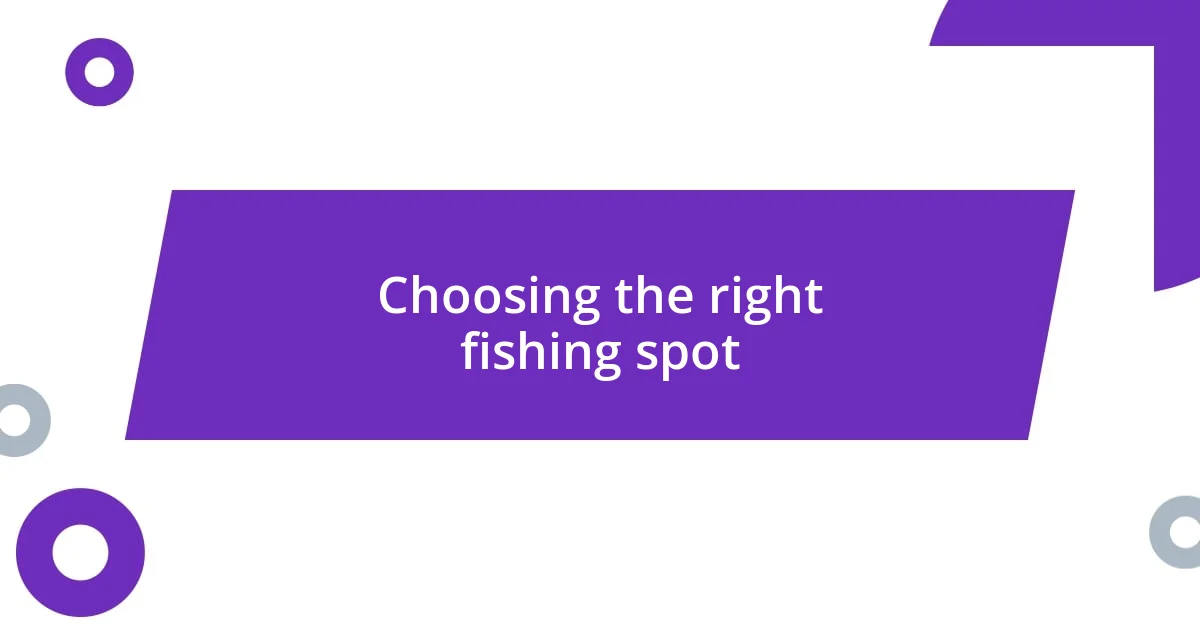
Choosing the right fishing spot
Choosing the right fishing spot can make all the difference between a great day on the water and a frustrating one. I remember my early days when I thought any body of water would suffice. However, as I gained experience, I realized that factors like depth, structure, and water temperature significantly influence fish behavior. Have you ever noticed how some areas seem to produce more fish than others?
Another key consideration is timing — not just the time of day, but also the season and weather conditions. I’ve found that early mornings or late evenings often yield better catches due to fish being more active. Also, pay attention to local weather patterns or moon phases; these can really impact your success. It’s fascinating how nature’s rhythms can guide your fishing adventure!
Lastly, don’t forget to observe other anglers. I learned this lesson the hard way when I stubbornly stuck to a spot that wasn’t producing much. By simply watching where others were catching fish, I found several new locations nearby that yielded much better results. Engaging with fellow fishermen can lead to surprising insights and shared wisdom that truly enhances the experience.
| Factor | Importance |
|---|---|
| Water Depth | Fish prefer certain depths based on species and time of day. |
| Structure | Rocks, weeds, and submerged logs provide cover for fish. |
| Weather Conditions | Wind, clouds, and temperature can affect fish activity. |
| Time of Day | Certain times, like dawn and dusk, can enhance fishing success. |
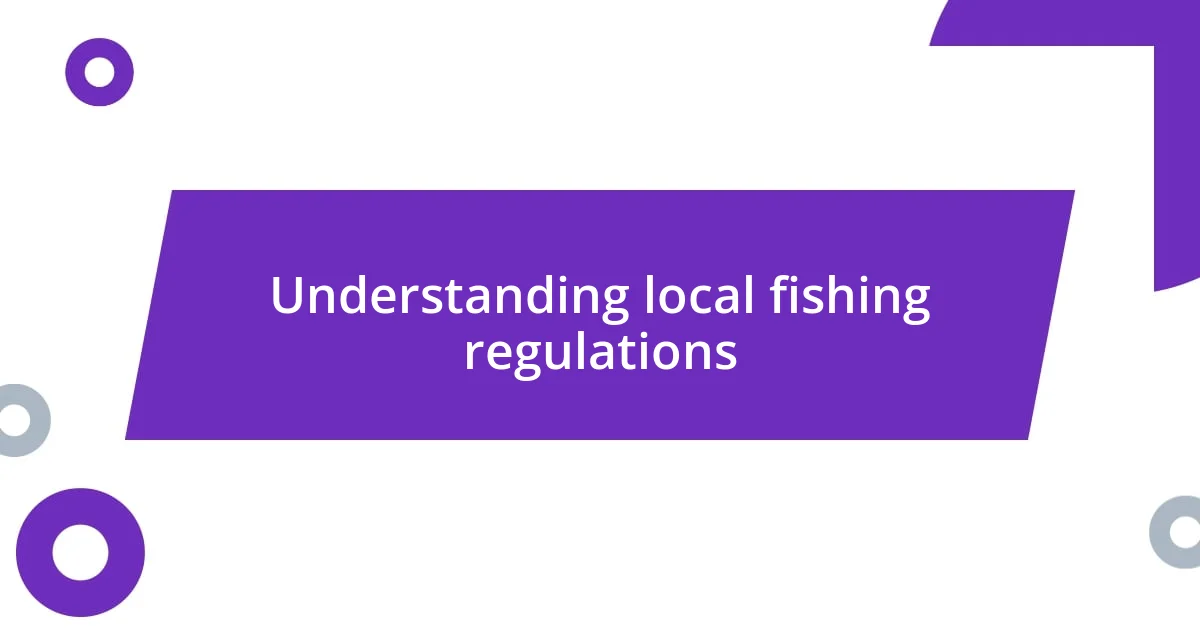
Understanding local fishing regulations
Understanding local fishing regulations is crucial for responsible angling. I remember the first time I fished in a new area; I was excited but totally unprepared. It wasn’t until I got approached by a local ranger that I realized I didn’t have the appropriate permits. Not only did this moment leave me feeling embarrassed, but it also taught me that knowing the rules can keep you fishing more and worrying less.
It’s essential to familiarize yourself with regulations that may vary significantly from one location to another. Consider these key points:
- Licenses and Permits: Always check if you need a fishing license and ensure you have it before starting.
- Catch Limits: Most areas have restrictions on how many fish you can catch per day; understanding these helps sustain fish populations.
- Size Limits: Some regions require fish to meet a specific size to be kept, ensuring young fish can continue to grow.
- Seasonal Restrictions: Certain species have closed seasons to protect them during mating times.
- Banned Species: Learn about any fish species that cannot be targeted at all, preventing damage to local ecosystems.
Staying updated on local fishing regulations not only enhances your experience but also contributes to preserving the waters we all cherish. I now make it a habit to research regulations before every trip, and it truly allows me to focus more on the joy of fishing rather than the fear of fines.
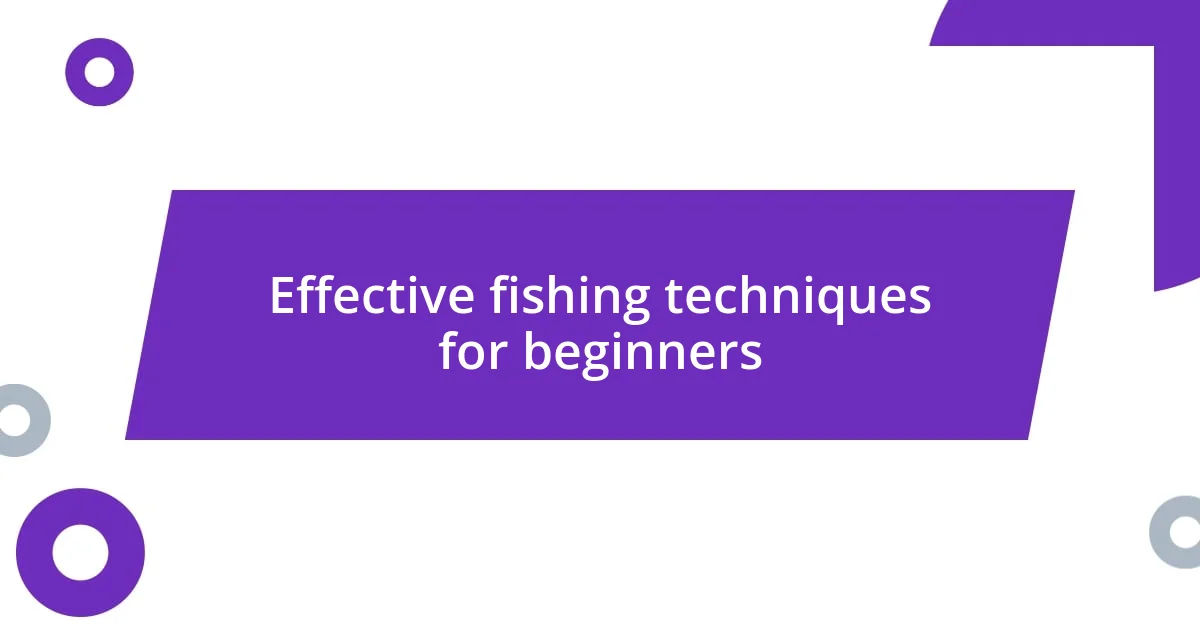
Effective fishing techniques for beginners
When it comes to effective fishing techniques, mastering the art of casting can make a significant difference. I still remember the first time I cast my line and accidentally snagged a tree branch instead of the water. It was a humbling experience that taught me the importance of technique over sheer enthusiasm. Practicing your cast in an open area helps develop precision, ensuring your bait lands where the fish are more likely to bite. Have you ever thought about how a well-placed lure can attract a curious fish?
Another technique worth exploring is the use of different bait types based on the species you’re targeting. In my early fishing trips, I caught plenty of fish using just worms, but once I started experimenting with artificial lures and live bait, my success skyrocketed. Each bait has its own appeal. For instance, shiny lures can mimic the movements of smaller fish, while deep-diving lures can reach those elusive catches below the surface. Understanding what the fish in your area are eating can truly enhance your chances of landing a big one.
Lastly, I can’t stress enough the value of patience. Early on, I often rushed my approach, missing crucial moments when fish were actively biting. Have you wondered why some anglers spend hours in the same spot? It’s not just about waiting; it’s about watching and being in tune with the water. Take note of any ripples, jumps, or swirls that suggest fish are nearby. Enjoying the serene moments on the water can lead to valuable insights about when and where to strike.
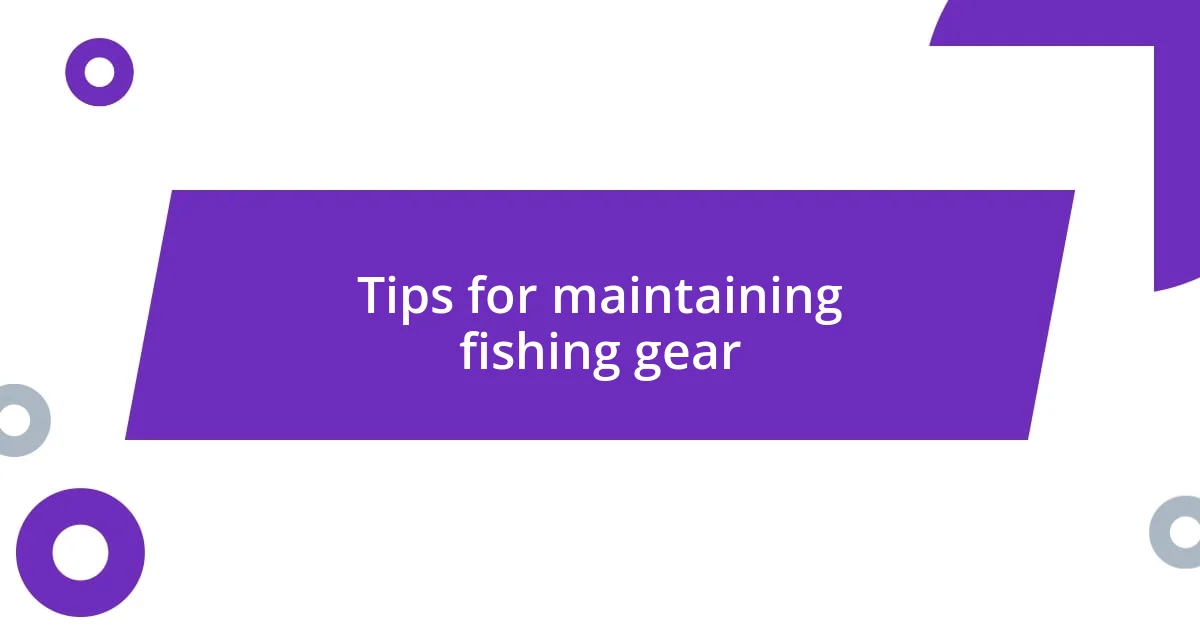
Tips for maintaining fishing gear
When it comes to maintaining fishing gear, I can’t stress the importance of regular cleaning enough. After a day of fishing, I’ve learned that rinsing my gear with fresh water not only removes salt and dirt, but it also prolongs the life of my rods and reels. I remember one time neglecting this step, only to find my reel completely corroded a few months later. Have you ever wished you could turn back time on gear maintenance?
Another tip that has saved me countless headaches is the regular inspection of line and knots. I often find that checking for frays or weak points can mean the difference between landing a trophy fish and losing it right at the boat. It’s a simple habit, but each time I retie my knots, I feel a surge of confidence knowing I’m prepared for whatever swims my way. Why do some anglers overlook this crucial step? From my experience, a little proactive maintenance goes a long way.
Lastly, properly storing your equipment is essential. I used to throw everything into a messy tackle box, only to waste precious minutes untangling lines before my next trip. Once I organized my gear, using labeled compartments and ensuring everything was dry, I realized how much easier my fishing experiences have become. Have you ever considered how an organized setup can enhance your fishing time? I can assure you, taking these small steps for your gear really pays off in the long run.
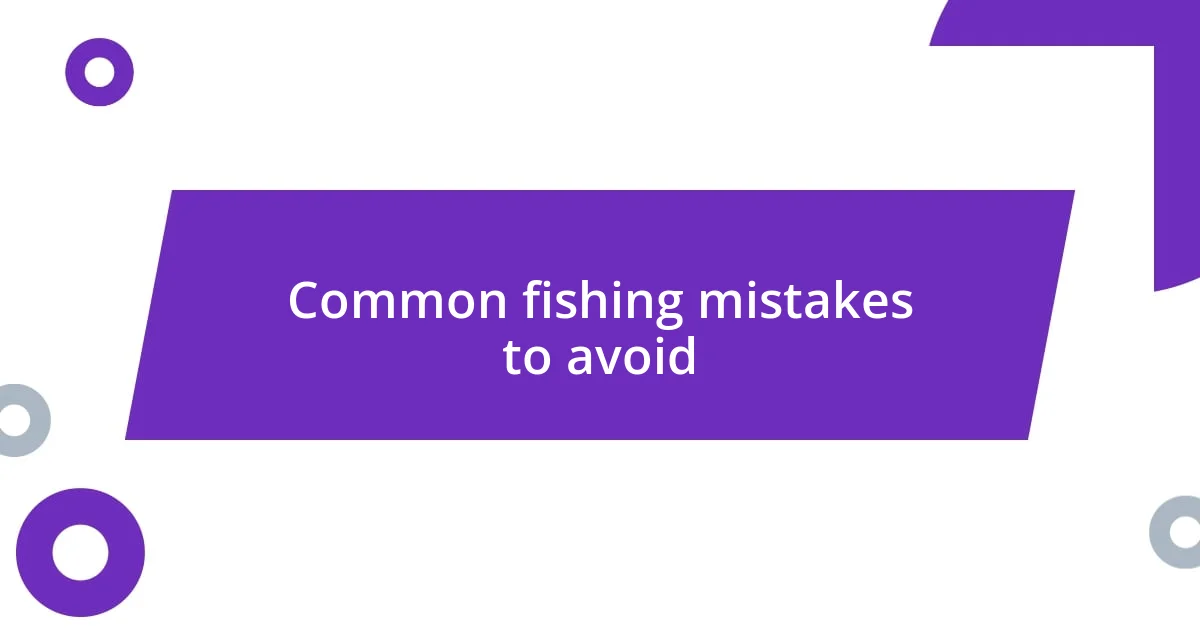
Common fishing mistakes to avoid
One common mistake that many beginner anglers make is not paying attention to weather and water conditions. I recall one fishing trip where I was utterly oblivious to an impending storm, thinking I’d catch a big one just like the last time. Instead, the sudden downpour made the river murky and spooked all the fish. Have you ever wondered how powerful nature can be in shaping your fishing experience? Understanding factors like temperature, wind, and barometric pressure can truly enhance your chances of success.
Many anglers underestimate the significance of local regulations and fishing seasons. I once got excited seeing a great spot and cast my line, only to discover later that it was a no-fishing zone. The embarrassment was palpable, and I realized that a quick check of the fishing rules could have saved me both time and frustration. Have you considered how much easier your fishing trips might be with a little preparation on the legal side? Trust me, staying informed helps you fish responsibly and contributes to conservation efforts so that future generations can enjoy the same pastime.
Improper tackle selection can also lead to disappointing outings. Early in my fishing journey, I would often show up with the wrong gear for the species I was aiming to catch. I fondly remember using a light spinning rod to go after hefty catfish, only to find myself losing more fish than I hooked. It was disheartening! Have you ever experienced the frustration of not catching anything due to mismatched tackle? Investing just a little time in understanding the right rod, reel, and line strength for your target fish can make all the difference in your success.
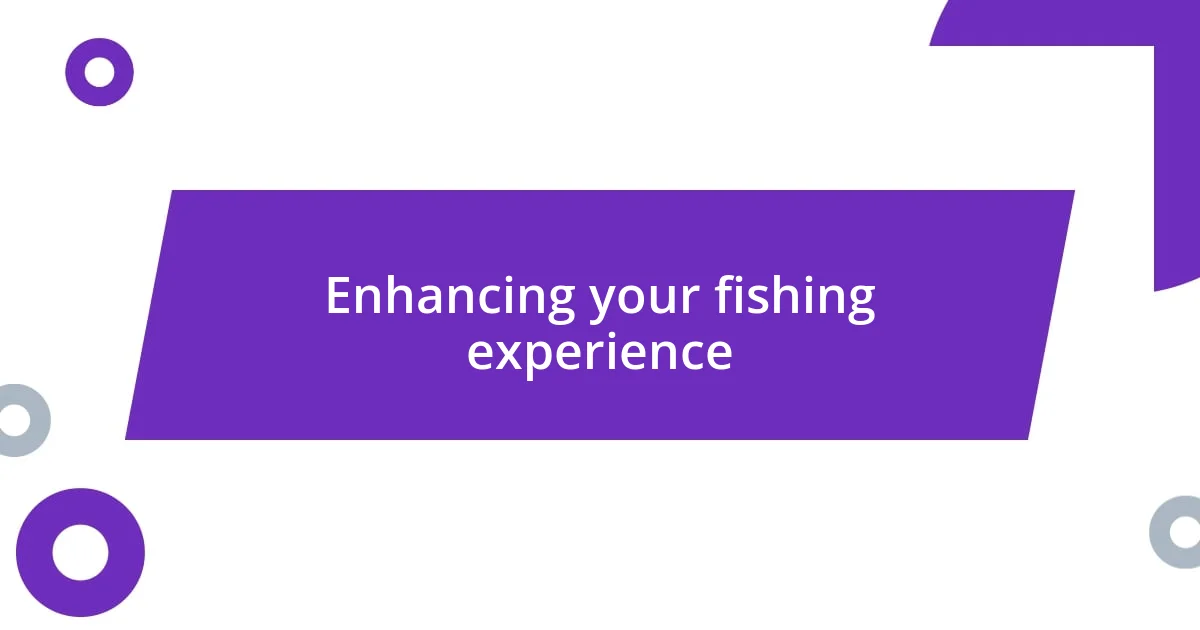
Enhancing your fishing experience
Fishing is as much about the journey as it is about the catch, and I’ve found that embracing mindfulness while on the water can tremendously enhance my experience. I recall a peaceful morning trip where I just soaked in the sounds of nature around me—the rustle of leaves, the soft lapping of waves. It’s amazing how such moments can deepen your connection to the sport and make every cast feel more meaningful. Have you ever considered how gratitude for the surroundings can transform your fishing experience?
Additionally, I’ve discovered that joining local fishing communities can open up a wealth of knowledge and camaraderie. During a meet-up with fellow anglers, sharing tips and experiences sparked inspiration and gave me new insights into techniques I hadn’t previously tried. There’s something powerful about being part of a group that shares your passion. Have you thought about how collaboration and friendships could elevate your fishing outings? Each conversation can lead to unexpected tips or even new fishing buddies.
Lastly, don’t underestimate the joy of experimenting with different fishing techniques. I vividly remember the thrill of trying fly fishing for the first time; it was like learning a new language! The challenge and excitement kept me engaged and pushed me to step outside my comfort zone. What if you could unlock new experiences by simply trying something different? Embracing this mindset can not only improve your skills but also reignite your passion for fishing.












